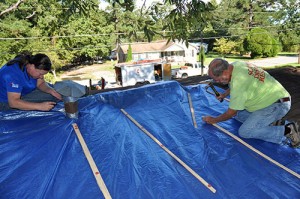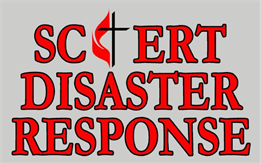
Hurricane season is upon us. Now is the time – before a storm hits – to make sure your church is prepared!
Check out these preparedness tips
 Plan an evacuation route
Plan an evacuation route
- Know where to go.
- If you are ordered to evacuate, know the local hurricane evacuation route(s) to take and have a plan for where you can stay. If emergency management officials tell you to leave town because of a hurricane threat, you should leave.
- Contact your local emergency management office or American Red Cross chapter and ask for the community hurricane preparedness plan. This plan should include information on the safest evacuation routes and nearby shelters. Learn safe routes inland. Be ready to drive 20 to 50 miles inland to locate a safe place.
- If you are not in an area that is advised to evacuate and you decide to stay in your home, plan to obtain adequate supplies in case you lose power and water for several days and you are not able to leave due to flooding or blocked roads.
Put together a go-bag
- Your disaster supply kit should include a flashlight; a portable, battery-operated radio and extra batteries; cash and credit cards; sturdy shoes; a first aid kit and manual; emergency food and water; a non-electric can opener; medications; and copies of your critical information if you need to evacuate.
Make arrangements for pets
- Pets might not be allowed into emergency shelters for health and space reasons. Contact your local animal protection/rescue group for information on local animal shelters in areas you might be staying.
Teach family members what to do
- Make sure all family members know how to respond before, during and after a hurricane. Teach family members how and when to turn off gas, electricity and water. Teach children how and when to call 911, police or firefighters, and which radio station to tune to for emergency information.
- Make a family emergency communication plan. Many communities have text or email alert systems for emergency notifications. To find out what alerts are available in your area, search online using your town, city or county name and the word “alerts.”
- In case family members are separated during a disaster – a real possibility during the day when adults are at work and children are at school – have a plan for getting back together. Ask an out-of-state relative or friend to serve as the “family contact.” After a disaster, it’s often easier to call long distance. Make sure everyone in the family knows the name, address and phone number of the “family contact.”
Protect your windows
- Permanent shutters are the best protection. A lower-cost approach is to put up plywood panels. Use 1/2-inch plywood – marine plywood is best – cut to fit each window. Mark which board fits which window. Pre-drill holes every 18 inches for screws. Do this long before the storm. Trim dead or weak branches from trees to reduce the risk of their falling on your home.
Check into flood insurance
Prepare your church
- UMCOR’s “Connecting Neighbors Leadership Training Program” gives volunteer trainers the tools and information they need to develop a local church disaster-response ministry.
- Even if your church is not ready for training, do something. Example: Create a video inventory of your church buildings, room by room. Perhaps a young person could take ownership of this task.
Know what to give – and what not to give
- In the wake of a hurricane, UMCOR will collect funds to help meet both the immediate and long-term needs of hurricane survivors.
- Assemble relief-supply kits – particularly health kits and school kits – so UMCOR’s warehouses can get kits into the hands of people who really need them.
- Don’t give clothes. They often become “the second disaster.”
- For more about appropriate disaster donations, click here.
- Your gift to UMCOR U.S. Disaster Response, Advance #901670, allows UMCOR to support annual conference disaster response efforts with training and timely resources.
- You also can give directly to the Disaster Response Ministry of the South Carolina Conference of the United Methodist Church.

When there is no hurricane
- Make a hurricane plan
- Know your hurricane risk. Talk to your local emergency management agency.
- Make an emergency plan.
- Sign up for alerts and warnings.
- Make a family communication plan.
- Plan shelter options.
- Know your evacuation route.
- Build or restock your basic disaster supplies kit, including food and water, a flashlight, batteries, chargers, cash and first aid supplies.
- Consider buying flood insurance.
- Familiarize yourself with local emergency plans. Know where to go and how to get there should you need to get to higher ground or to evacuate.
- Stay tuned to local wireless emergency alerts, TV or radio for weather updates, emergency instructions or evacuation orders.
- There are many resources to help you prepare yourself, your family and your neighbors. Three of the best preparation guides are:

 Plan an evacuation route
Plan an evacuation route

